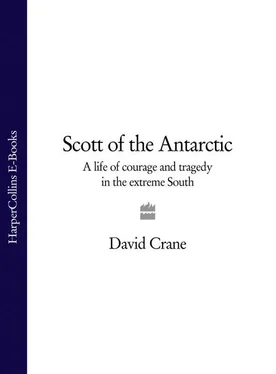1 ...7 8 9 11 12 13 ...17 The descendant on his father’s side of the last Scottish Lord High Admiral, and on his mother’s side of the last English one, the great-grandson of William IV and his mistress Mrs Jordan, the heir to one of the great names in Scottish history and to a lineage that fancifully traced itself back to Shakespeare’s Macduff – an intriguing thought, when one remembers what happened to his children – ‘Rosy’ Wemyss might have been designed to show Scott what he was up against. He had entered Britannia four years ahead of Scott in the same term as the future George V, and his naval life since had taken him via a berth on the royal cruise in Bacchante that spawned half the navy’s future leaders in a seamless rise that pointed inexorably to the Royal Yacht Osborne and a guaranteed future.
With his meagre midshipman’s pay of £30 a year, and whatever his father could do to help, Scott’s future must have looked a lot more circumscribed, but at least he was doing what he could to make it his own. Another series of ‘VG’s when he left Monarch was followed by a similar verdict from his next captain in the corvette Rover , and his examinations the following year for sublieutenant bore out their judgement, with Scott obtaining First Class Certificates in four of the five disciplines, and a Second in Gunnery.
He soon had his chance, too, to practise his profession in as exacting conditions as anything but actual war could provide. At the beginning of July 1888 he was appointed to the gunboat Spider at Portsmouth, and when it joined its flotilla at Lough Swilly later the same month he was lucky enough to find himself at the heart of the most dramatic and politically significant manoeuvres the Victorian navy ever carried out.
It is almost impossible now to realise the place that the Royal Navy then held in the national affections, the interest that was taken in everything it did, the column inches it could command in the newspapers, and the keen attention with which the manoeuvres were followed. Underpinning this interest was a patriotic belief in the navy’s superiority over any force in the world, so when in the summer of 1888 an inferior ‘enemy’ fleet under Sir George Tryon – which included Spider – broke out of a close blockade and created mayhem up and down the coasts of Britain, ‘sinking’ merchantmen, ‘wiping out’ towns and holding whole cities to ransom, the nation took fright. *
In one sense, Tryon’s unorthodoxy and swagger was just what England expected – proof again that the Nelsonian spirit was alive and well – and yet at the same time, if a Royal Navy admiral could do this, what was to stop an enemy doing the same? ‘It is enough to make one tremble to think of what would befall [Liverpool],’ wrote The Times ’s correspondent, on board Tryon’s Ajax as his six ironclads, three torpedo boats and five cruisers dropped anchor unopposed in the Mersey, ‘if we were really a foreign enemy’s fleet, and there is evidently no reason in the world why one should not some fine day do as we have done unless some more efficient means are taken to prevent it. It seems to me almost incredible that an enemy’s fleet of inferior – and very much inferior – strength should be able, without the slightest attempt at resistance by the British naval forces, to force a blockade in one port and then still without opposition, to storm up the Mersey and exact whatever ransom it pleases, with the alternative of utterly destroying Liverpool … What Sir George Tryon has done a French or German admiral might do and could do.’
In the short term this exercise had profound effects, leading in the Naval Defence Act of the following year to the adoption of the ‘two-power standard’ – the idea that the Royal Navy should equal the combined strength of any two foreign powers – and in the longer term it fed into the invasion paranoia of the years before the First World War. For any impartial observer Tryon’s triumph had also revealed the fundamental flaws that radicals within the service had long recognised, and if anything was needed to point up the moral it was the fact that Albert Markham – polar explorer, ‘authoritarian’ supreme, and the man who six years later would ram the Victoria and kill Tryon – was the hapless commodore of the ‘British’ force that had let the ‘enemy’ ‘B’ Fleet give it the slip.
These manoeuvres were Scott’s last excitement for some time, and at the end of August 1888 he left Spider for the second-class cruiser Amphion , and another long haul away from England and family on the Pacific Station. ‘My dearest old Gov,’ he wrote to his father on the voyage out, with ‘a heavy following sea’ the Amphion ‘nearly turned on end & performed capers. Everything on board was miserable – I was cold, I was dirty, I was slightly seasick, very homesick, hungry, tired & desperately angry – the wardroom was upside down, my cabin was chaotic & stuffy. In dull despair I sat myself in an armchair in the wardroom & determined not to move till the weather moderated – I should have kept my promise if the chair hadn’t broken – I was cursed by the infuriated owner. Shall I describe to you what sleeping over [the] screw is? First the bunk shakes from under you (in itself a pleasant sensation – very) then a sudden stop with a loud noise best written as “Wumph” that’s when the sea strikes the stem – then the screw seems to stop – up goes the stem again accompanied by the most infernal rattling … shaking the whole ship. Imagine all this accompanied by a motion which would land you on the floor if you were not tucked in. And yet through all this I slept a sweet, gentle refreshing sleep accompanied by a hideous nightmare and from which I woke with a very bad head and promptly spilled my water can over my cabin … My dear old chap! I don’t think I can really go on. I will say goodnight and goodbye with heaps of love to everyone.’
Scott was always good on the physical miseries of ship’s life, but it was the Amphion ’s captain, Edward Hulton, who was guaranteed to bring out the best in him as a letter-writer. ‘Alas! the skipper remains fussy,’ he complained on the same voyage; ‘he is an extraordinary man – at all hours of the night on watch you are liable to a flying visit from a spectral figure. There is no waste of time, from the moment he sees you until he is again lost from view, you are subjected to a running fire of orders (all utterly unnecessary – par parenthesis). The end of this storm gradually lessens in sound until the words become indistinct. After a time you don’t pay much attention, but it still would be annoying if it were only for the number of times you have to say “yes sir” in reply.’
‘Captain Hulton still affords great amusement,’ he could still write at the end of his time in Amphion . ‘I was walking back with him at Gibraltar from a dance the other day; he said he knew a short cut which we proceeded to find, we hadn’t got very far when we heard the familiar “alt, who goes there” (Gib simply bristles with sentries). “Friend” said the Captain. “There ain’t no friends in Gibraltar” answered the voice. “But my good man I am the Captain of the man of war etc etc” “Can’t ’elp that – yer can’t pass” “But really my good man I belong to the Navy, the Royal Navy, I’m a Captain.” “Can’t ’elp that – there’s soldiers and there’s officers and there’s ’nabitants but there ain’t no friend and yer’d better go back again.” He went.’
Scott was not always so elastic in his spirits, and sandwiched between these two letters is a fragment of diary, undated but probably belonging to the summer of 1890, that conveys a very different picture. ‘After many more or less futile efforts,’ he wrote, ‘I again decide on starting a diary. It being therefore my wish in starting such a work (for work in the sense of labour it undoubtedly is) merely to please myself, I make the experiment of transcribing my thoughts, hoping that the disappointment that will necessarily meet me in the inefficiency of my pen, will in some measure be compensated by the interest stored up for future years, when the mutability of time, ideas and sentiments will have undergone their common evolution … How I have longed to fix some idea, only so I may build from it – but though the words or general meaning may remain in what is written, the attraction has vanished like some will-o’-the-wisp and I find myself sitting idea-less and vacant … The vague argument that something must be done to express myself on paper even as an ordinary gentleman should, urges me on; there comes too a growing fear of my own thoughts; at times they almost frighten me … ’
Читать дальше












![John Bruce - The Lettsomian Lectures on Diseases and Disorders of the Heart and Arteries in Middle and Advanced Life [1900-1901]](/books/749387/john-bruce-the-lettsomian-lectures-on-diseases-and-disorders-of-the-heart-and-arteries-in-middle-and-advanced-life-1900-1901-thumb.webp)